Tech titans would have us believe that they will usher in a ‘golden age’ and uplift humanity by ‘upgrading’ human biology with technology. The ‘savior’ for humanity will be technology; tech will be God…or so they would like us to believe.
What is the ultimate goal of the attempt to alter human biology through tech? Ray Kurzweil, who is employed by Google as an “AI visionary,” states that it is about extending our lifespan, possibly living for hundreds of years or potentially defying death altogether.
Is there technology within us already?
While some want us to look without and have something external to rely on – aka technology, as a believer in divinity, I am interested in looking within. The question then becomes, did our Creator put technology inside us that is yet to be discovered?
One possibility is DMT, the mind-altering psychedelic within that might allow us to see into other dimensions. For this post however, let’s talk about a different technology – and I am referring to the physics of time density.
By the way, did you hear the Chief Technology Officer for the Trump Administration say last week that the US has technology that can “manipulate time and space”?
Studying the Stars
Okay, I realize that it is crazy to try to wrap your head around this concept, but there is actually something to it. It’s not a new idea; it was discovered over 50 years ago. Back then, Dr. Nikolai Kozyrev, a respected Russian astrophysicist, was studying how stars evolve. To his surprise, stars do not follow the accepted laws of physics. They form much faster than would be expected and grow to resemble each other. Kozyrev knew there must be more to the story since this couldn’t be explained by known principles.
I highly recommend a little book called Psychic Discoveries Behind the Iron Curtain, which was published in the 70s. One chapter of the book includes an interview with Kozyrev. He explains how he developed the theory that stars form based on a force in physics that was unknown before, and he labeled it the ‘density of time.’
Time is not what it seems
We think of time as linear – past, present, and future but Kozyrev suggests that the flow of time is a force. That time is variable and, yes, can be manipulated. His theory also states that the Universe is not shrinking; it is not subject to the Second Law of Thermodynamics as we once thought.
Instead, he states, “In the Universe, there are no signs of the degradation described in the Second Law of Thermodynamics. Stars die and are born again. The Universe sparkles with inexhaustible variety.”
Kozyrev says that according to this ‘density of time’ theory, when death (entropy) increases in one place, it decreases in another place in the cosmos. Kozyrev’s ideas, although revolutionary, have been tested over the past 50 years by physicists in Russia, as detailed in this book.
I learned about this while researching the Shroud of Turin for a presentation I made at the Urantia Science Symposium III in 2022.
2,000 year old cloth teaches us about science
The Shroud of Turin is a 14-foot piece of linen cloth dated to approximately 2,000 years ago. It contains a three-dimensional image of a crucified man, which many believe is the image of Jesus. (The attempts to date this cloth to a later date - in medieval times have failed.)
First of all, I was astounded to learn that the image in this ancient burial cloth contains holographic information. Mostly, though, I was interested in delving into this topic because I don’t believe Jesus was God (that narrative was constructed at the Council of Nicea in 325 AD – before that time, he was not typically viewed as ‘God’).
I believe he was a person who, along with his co-equal Mary Magdalene, developed his consciousness to such an extent that he exhibited supernatural powers – but IMHO, he wasn’t the exception, but rather an example of what is possible.
For he said it himself, “....and greater things shall you do” (John 14:12). So, in my view, investigating the science of the Shroud, is not about Jesus as someone who did stuff we cannot do – but someone who showed what is possible for all of us.
Including the possibility of immortality - something Ray Kurzweil and others in Silicon Valley are obsessed with. No wonder the world's top scientists, including a team from NASA, have all studied this cloth. Even Hilter wanted to get his hands on the cloth and decode its secrets.
A British filmmaker who set out to debunk the Shroud ended up discovering its authenticity (and no longer identifies as an atheist). That same filmmaker is so convinced it is the real deal that he is offering one million dollars to anyone who can replicate the Shroud. So far, no one has taken him up on the offer.
As I dug into the research on the Shroud, I came across a documentary called the Fabric of Time, which included an interview with a Hungarian physicist, Isabel Piczek. Her scientific analysis of the cloth was as follows: we have to update science to understand what created this image because it defies the current laws of physics. She discusses how the body defied gravity when the image was made in a sudden, intense burst of radiation.
A New Branch of Physics
In a speech given in 1991 at a conference on the Shroud, Piczek discusses how the cloth is teaching us about science – a new branch of physics, that she called the physics of time. Piczek, who passed away in 2016, did not author any papers on this hypothesis I could find. Still, her discussion on the physics of time is the same force that Kozyrev came up with a few decades earlier.
As an astrophysicist, Kozyrev was not concerned with the operation of the human body, as much as how the stars and the cosmos function, but Kozyrev’s discovery aligns with decades of research by the CIA and Russian intelligence agencies.
And thanks to the late Claude Swanson, ex-CIA physicist we have record of this research and it is relevant to human biology and consciousness.
Not News to the CIA
While working for the CIA, Dr. Swanson learned that there is physics taught in universities – Swanson attended Ivy League schools, and then there is physics that is much more advanced that the government is working on.
As he discusses in his book, The Synchronized Universe, it was only when he began his classified government work that he realized there is a lot more known about physics than the public is led to believe and he discusses that googling ‘torsion physics’ will purposely produce disinformation.
What we are talking about here – this fifth force in physics, as physicist Swanson discusses in great detail in his 700-page book- is the same force that the Chinese have known for centuries – called chi. It’s the technology of ancient societies. It is the prima materia that ancient alchemy was concerned with.
It represents the fabric of space-time – Swanson defines torsion as a “twisting in the fabric of space-time.” Torsion represents a layer deeper than quantum physics, and even provides the capability for time travel. Nikola Tesla was involved in this same research.
Anyway, all of this is to say that what the classified government programs have been working on for decades, what Silicon Valley is planning for the elite, is the ability to potentially defy time and space. To become immortal.
You are already immortal
But something that they are missing is that this potential is already built into human beings. I do not say that as a hopeful statement. Rather, it is based on the scientific theory of the Shroud. When you understand Piczek’s findings, you realize that what is being called the fifth force in physics also operates within you.
Claude Swanson explains in his books that our DNA emits photons (electromagnetic energy) and torsion. We are made of the stuff of the stars. It’s the same force that Kozyrev, the astrophysicist, found in the stars above.
You have that in you. Now, I am not saying that all of us can resurrect like it happened with Jesus. Clearly, the man from Nazareth had a level of spiritual development that most people won’t reach in one lifetime.
Still, it’s not impossible – we are made of the same “ingredients,” and theoretically, we could do the same thing. Even when we shed our physical body and die a natural death, the point here is that we don’t really die. Our consciousness exists as torsion, which carries information and does not dissipate over distances.
To wrap this up, suffice it to say that our Creator already made us immortal. The Shroud is just one piece of evidence giving us that understanding. Thankfully, we don’t need Silicon Valley to save humanity; we can save ourselves – we are far more powerful than we get credit for being.











Dr. Jenny Martin’s article, "You Are Immortal," published on Substack on August 7, 2024, posits that human consciousness is inherently immortal, existing as a non-material, eternal essence that transcends physical death. Martin argues that consciousness, as a unique energetic signature, persists beyond the body, drawing on the first law of thermodynamics to suggest that energy (equated with consciousness) is neither created nor destroyed, only transformed. Infused with spiritual references to God and reincarnation, the article challenges materialist views tying consciousness to brain activity, encouraging readers to embrace their immortal nature to live fearlessly. Its accessible, inspirational tone reflects Substack’s role in fostering public intellectualism, though it lacks the empirical rigor expected in academic discourse.
This response critically evaluates Martin’s claims within philosophical, scientific, and cultural contexts. Philosophically, her argument aligns with Platonic dualism and panpsychism, but it fails to address counterarguments, such as the interaction problem in dualism or materialist perspectives that view consciousness as brain-dependent. Scientifically, Martin’s conflation of consciousness with thermodynamic energy is problematic, as consciousness is not a measurable physical quantity, and neuroscientific evidence suggests it relies on brain activity. While the article’s spiritual framework resonates with existential concerns, its speculative nature and lack of testable hypotheses limit its academic credibility, positioning it as a thought-provoking but unrigorous contribution to immortality discourses.
The article’s societal implications include alleviating fear of death, aligning with psychological theories like Terror Management Theory, but it overlooks ethical concerns, such as the prioritization of spiritual over material solutions to suffering. Published on Substack, it benefits from the platform’s accessibility, yet its informal tone and lack of peer review constrain its scholarly impact. While Martin’s work taps into cultural desires for meaning, its empirical and philosophical gaps highlight the need for further interdisciplinary research into consciousness and immortality, balancing hope with evidence in addressing humanity’s existential questions.